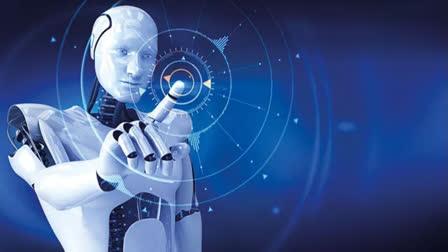New Delhi:As Artificial Intelligence (AI) rapidly becomes a significant part of the global landscape, the Indian government’s initiatives to integrate AI into the country’s infrastructure are met with optimism and caution.
In an exclusive interview with ETV Bharat, Professor Charru Malhotra (Doctorate), a prominent expert in e-governance and Information technology (ICT) at the Indian Institute of Public Administration (IIPA), discussed India’s efforts to advance AI while also addressing the emerging cybersecurity risks associated with its growth.
India’s AI Mission: A Bold Move Forward: India’s AI journey has witnessed substantial growth over the past few years. Malhotra emphasised the government’s strong commitment by introducing the India AI Mission, a comprehensive plan to position AI as a cornerstone for the country’s digital transformation.
This initiative is well-supported by a dedicated budget of Rs 10,300 crore allocated in the recent Union Budget. The mission focuses on building advanced computational infrastructure, creating applications, and developing Centers of Excellence to enable AI-driven innovation across sectors.
“The government has significantly focused on developing AI technology, ensuring that India is not left behind in the global race. The AI mission is a robust effort, with investment directed toward capacity building, infrastructure development, and the application of AI in government processes,” Malhotra stated.
In addition to the AI Mission, the government is also investing in capacity-building programmes. One of the major initiatives includes the Future Skills Prime programme, aiming to enhance the digital capabilities of India’s youth.
This initiative, a collaboration between the Ministry of Electronics and NASSCOM (a not-for-profit industry association), focuses on training students to be industry-ready in the rapidly growing tech field.
The Visheshwar PhD Scheme offers a significant incentive, with a grant of Rs 5 lakh for students pursuing a PhD in AI, supporting the creation of a skilled workforce to drive the nation’s AI vision.
Cybersecurity: A Growing Concern in the Age of AI:While AI promises significant advances, it also raises substantial concerns about cybersecurity. Malhotra acknowledged that AI is a double-edged sword, as it can both strengthen and compromise cybersecurity.
On one hand, AI tools can be employed to counter vulnerabilities in machines and networks, offering predictive capabilities to safeguard against cyber threats. On the other hand, generative AI, a rapidly developing branch of this technology, has emerged as a tool for cybercriminals.
“AI has a dual role in cybersecurity,” Malhotra noted. “It can be used to predict and defend against cyber threats, but it can also be weaponised by malicious actors to create sophisticated cyberattacks. We must be prepared for this,” she said.
She cited examples of how cybercriminals have leveraged AI to create malicious codes, develop malware, conduct SQL injections, and even poison data sets, underlining the importance of having stringent cybersecurity measures in place.
An SQL injection attack consists of the insertion or “injection” of a SQL query via the input data from the client to the application. Malhotra stressed that every organisation, especially those handling sensitive data, must have robust guidelines and safeguards to protect their infrastructure and information from cyber threats.
The Digital Footprint: A Growing Risk for Individuals:As AI and cybercrime threats evolve, individual users are also increasingly vulnerable. Malhotra highlighted the risk posed by digital footprints, taking keynote of the fact that social media platforms can expose personal information to hackers and cybercriminals.
